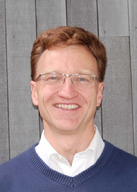
Professor and Chair of Magnetic Detection & Imaging
Extern: Donders Instituut Nijmegen
University of Twente
Faculty of Science and Technology
Institute for Biomedical Technology and Technical Medicine (MIRA)
E-mail: d.g.norris@utwente.nl
Principal Investigator: MR Techniques in Brain Function
Donders Institute for Brain, Cognition and Behaviour
Centre for Cognitive Neuroimaging
Radboud University Nijmegen
P.O. Box 9101
NL-6500 HB Nijmegen
The Netherlands
Visiting Adress:
Kapittelweg 29
6525 EN Nijmegen
Tel/Fax: +31 24 36 10649 / 10989
E-mail: david.norris@donders.ru.nl
GENERAL INFORMATION
David Norris studied Physics at Cambridge University (Bachelors degree 1981) and subsequently gained both his Masters (1983) and his PhD (1987) degrees from Aberdeen University. He then spent eight years at the University of Bremen working on a broad range of methods in biomedical magnetic resonance including fast imaging techniques, diffusion biophysics and proton spectroscopy. In 1995 he gained his habilitation from Bremen (D.Sc.) and took a position as head of MR Physics at the newly founded Max-Planck-Institute for Cognitive Neuroscience in Leipzig. Here he developed a strong interest in the methodology and mechanisms of functional magnetic resonance imaging (fMRI), and methods of measuring connectivity with MRI. In 2001 he became a Principal Investigator at the FC Donders Centre in Nijmegen, and in 2003 was appointed a Professor at the Radboud University. In 2005 he was appointed a member of the Medical Faculty at the University of Duisburg-Essen in the context of the collaboration between the Radboud University and Duisburg-Essen in high field MRI, The Erwin L Hahn Institute. In 2010 he was appointed Professor in Neuroimaging at the University of Twente. In the context of the role in Twente a number of Bachelors and Masters projects have been conducted by Twente students in Nijmegen.
RESEARCH INTERESTS
Contrast mechanisms and physiology of functional Magnetic Resonance Imaging (fMRI); MR-methodology for fMRI; resting state fMRI; correspondence between MR activation and electrophysiological measures; mechanisms of diffusion contrast in MRI; diffusion imaging methodology including diffusion tensor imaging; perfusion imaging.
TEACHING RESPONSIBILITIES
None in Twente
